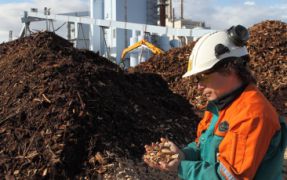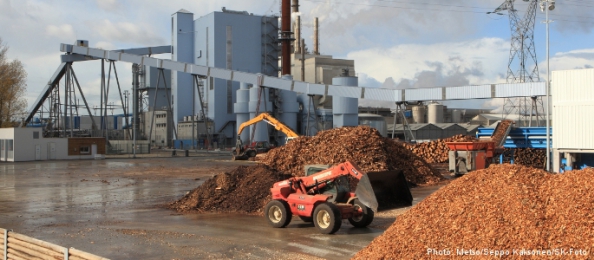New Technology Brought Cleaner Air and New Jobs to Facture
Residents of Facture, a city in southwest France, have been breathing cleaner air since October 2010. A biomass-fired combined heat and power plant – which is one of Europe’s largest and represents Metso’s latest technology – was commissioned at the energy company Dalkia’s new biomass power plant, located at the local Smurfit Kappa paper mill. For Metso, a global engineering and technology company, this delivery was an excellent opportunity to demonstrate its ability to support its customers in combining business objectives and environmental targets
The investment is the largest in France’s national green energy program, which aims to reduce CO2 emissions and to curb climate change. The plant is fueled with bark from the mill and forest residue collected from neighboring areas, which means that the plant is partly self-sufficient in fuels. The collection of forest residue has also created new jobs for the local people.
Owned by Dalkia, the plant produces electricity for the national grid and generates process steam for the paper mill. With the ability to use a mix of different renewable biomasses, it is an example of a solution that enables a step-by-step transition from fossil to renewable energy fuels. The Facture power plant’s CO2 emissions are reduced by 400,000 tons annually compared to the same energy produced by fossil fuels.
| Initiator | Metso |
| Project start | 2010 |
| Status | completed |
| Region | France |
| Contact person | Paula Niemistö |
| Awards |
Project benefit
- Reduced CO² Emission of approximately 400000 tons
| Anti-Corruption | - |
| Business & Peace | - |
| Development | - |
| Environment | X |
| Financial Markets | - |
| Implementing UNGC Principles in your Corporate CSR Management | - |
| Human Rights | - |
| Labour Standards | - |
| Local Networks | - |
| Advocacy of global issues | X |
| Business opportunities in low income communities/countries | - |
| Project funding | - |
| Provision of goods | - |
| Provision of services/personal | - |
| Standards and guidelines development | - |
Environmental challenge: More with less
“Energy demand is continuously increasing and natural resources are scarce, so we should produce more with less. An efficient way to produce energy without doing it at the expense of nature is to use biomass as a fuel. Metso has been working on bioenergy since the 1980s by developing several remarkable technologies for biomass and waste-based energy production; the Dalkia power plant in Facture is just one example,” says Kai Mäenpää, Vice President, Europe, Middle East, Africa, at Metso Power business line. Metso’s full-scope delivery to Facture included the process equipment – from the fuel-handling systems and biomass boiler to the flue-gas cleaning and complete automation solutions. The delivery is environmentally advantageous, not only today but it will also be so in the future. Proven technologies in combustion, automation, and fuel-handling enable Dalkia to operate the plant in the framework set by tight emission guarantees. Plus, the power plant will be able to meet future regulations as well, if changes are made in the fuel base.

Photo: Metso/Seppo Kaksonen/SK-Foto
Ambitious climate targets
Environmental legislation is intensifying all over the world. In Facture, the monitoring and reporting of emissions is compliant with EU directives and local regulations. The customized automation solution provided by Metso facilitates all the necessary information for self-monitoring and for reporting to the authorities.
The targets for curbing climate change have been set high: For example, the European Union Member States have been required to provide 20 percent of final energy consumption from renewable energy production by 2020. However, according to the International Energy Association, 70 percent of the power plant capacity needed in 2030 has not yet been built. To meet the ambitious climate targets, the new capacity should mainly be based on renewable energy sources, such as biomass.
Advanced technology a key to climate change
The use of advanced technology plays a significant role in curbing and adapting to climate change. The focus of Metso’s research and development activities is on environmental technology solutions. The targets in this area are based on energy conservation and cutting CO2 emissions, among other things. The solutions represent new technologies, such as waste and biomass utilization.
The company is currently building the world’s largest biomass gasification plant in Vaasa, Finland. As a result of the new solution, renewable energy can replace close to 40 percent of the coal-based energy used before. This will reduce CO2 emissions by about 230,000 tons per year.
Another fuel for the future is biooil. As a result of active research and development, Metso will supply a bio-oil production plant to a power plant owned by Fortum, in Joensuu, Finland. The delivery involves a demonstration plant in which bio-oil is produced from forest residue and other biomasses. The bio-oil produced can be used instead of heavy fuel oil, and, in the future, it may also be used in biodiesel production and as a raw material in the chemicals industry.
Eco-efficient solutions a natural outcome
In the global effort to support sustainable business practices, guidelines and initiatives have been developed to give guidance to global companies. One of most recognized guidelines is the UN Global Compact initiative, which Metso became a participant of in 2006.
“The UN Global Compact is a practical tool for us, not only in giving us motivation in our environmental business, but also on a broader scale in sustainability issues,” says Mäenpää. “Together, the UN Global Compact and Metso’s Code of Conduct are useful principles and practical tools in fostering a common understanding and commitment among our employees in over 50 countries. From the environmental business point of view, the Ten Principles of the Global Compact have a particularly strong link to Metso’s businesses. Principle 9 states the obligation to encourage the development and diffusion of environmentally friendly technologies. We are willing and able to take on this challenge.”
Metso is a world leading industrial company serving the mining, aggregates, recycling, oil, gas, pulp, paper and process industries. Our products range from mining and aggregates processing equipment and systems to industrial valves and controls. Our customers are supported by a broad scope of services and a global network of over 80 service centers and about 6,000 services professionals.
Write a comment about this page
Your comments are provided by your own free will and you take sole responsibility for any direct or indirect liability. In order to maintain the highest discussion quality, all comments will be reviewed by our editors. You hereby provide us with an irrevocable, unlimited, and global license for no consideration to use, reuse, delete or publish comments in accordance with our Community Guidelines.
About Us // Privacy Policy // Copyright Information // Legal Disclaimer // Contact
Copyright © 2012-2018 macondo publishing GmbH. All rights reserved.
The CSR Academy is an independent learning platform of the macondo publishing group.









